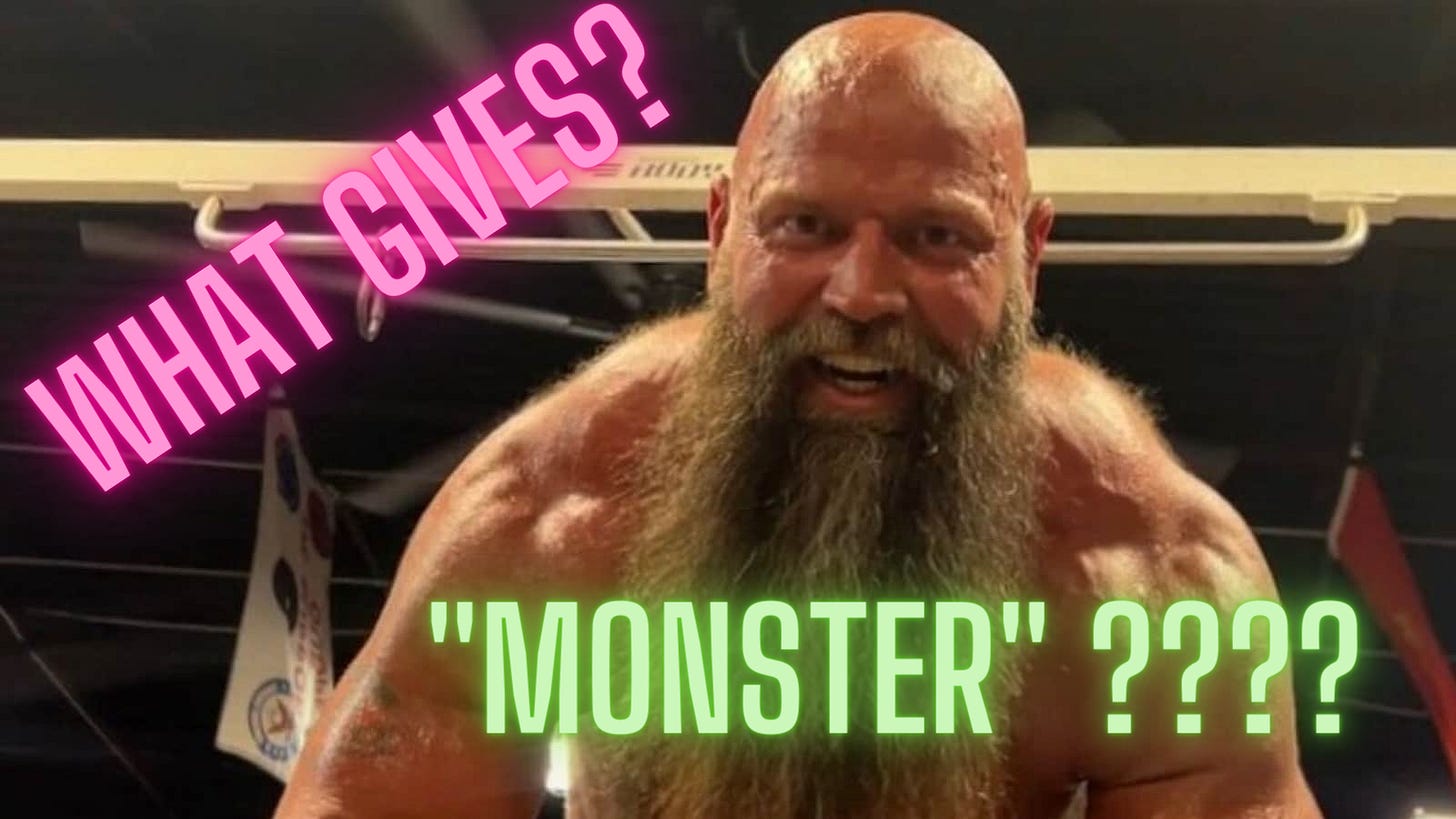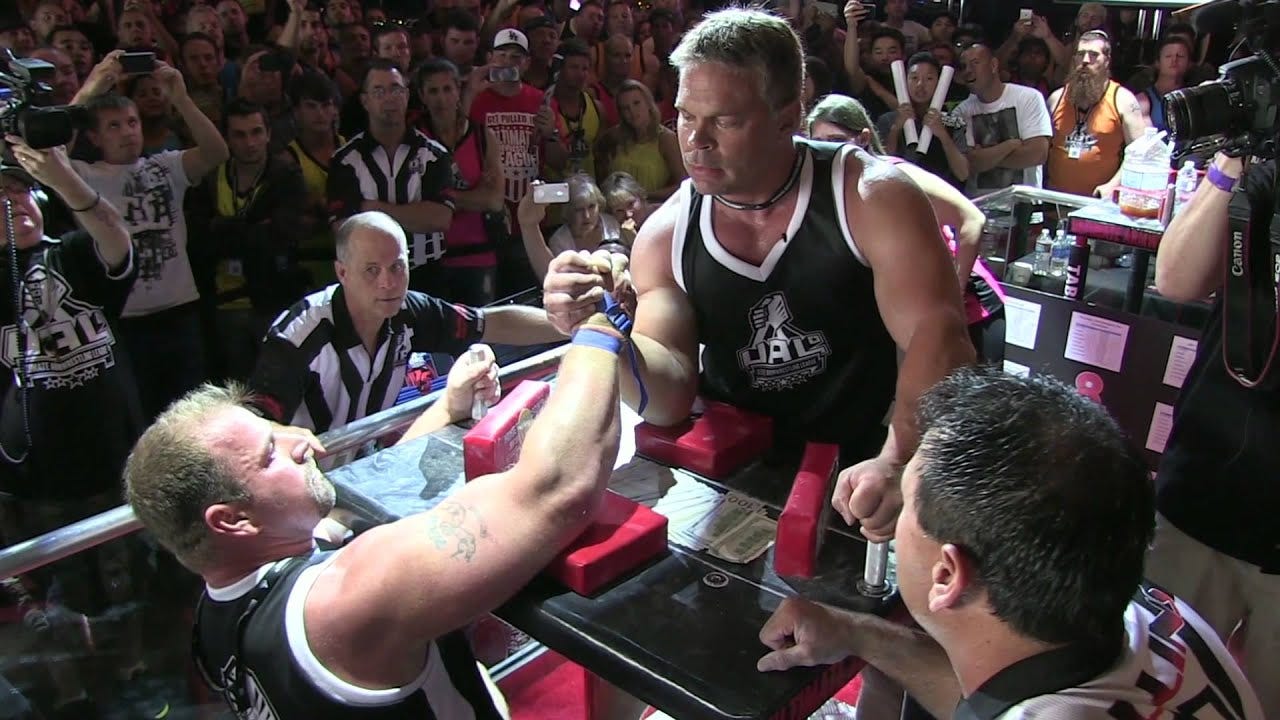“Monster” Michael Todd, a word class American armwrestler, wants you to know that he loves his wife, Rebecca.
He posted this not long after he lost to the “The Surprise” Kydirgali Ongarbaev, a young Kazakhstani phenom—who, legend has it, trains by letting people line up and test their mettle against him for hours on end—at East v. West. After the loss, Todd posted the above image, typical both for him and for social media. And nothing would seem strange about it had Todd not exploded with rage between rounds, screaming at the refs and those in his corner, including Rebecca.
There’s something about Michael Todd that sets him apart from his peers. Unlike Devon Larratt’s guru/heel routine, Todd Hutching’s boozy uncle who designs missiles for Boeing affect, Travis Bagent’s white trash Muhammed Ali braggadocio, or Matt Mask’s situational serial killer intensity, Michael Todd’s content buries the needle on the cringe-o-meter. Despite his recent string of losses, he’s still one of the biggest and best and most innovative armwrestlers America has ever fielded. Yet a pathetic quality courses through not just his content, but even his table time.
Why is that?
Michael Todd hails from what was once the brick-making capital of America, Hot Springs County, Arkansas. Nobody knows much about his childhood. He grew up pursuing martial arts, then eventually fell into armwrestling, which quickly consumed him.
By the early 2000s, Todd hit the national scene as an explosive shoulder presser, a move that looks exactly as it sounds—dipping your shoulder towards in center of the table and pressing your opponent sideways. Watching his old matches, you can see his natural athleticism, his keen instinct for his opponents’ soft points. He possesses a sharp sense of timing evident even in his match with Ongarbaev.
Yet as the years rolled on, Todd’s right arm accrued injuries that would change his entire game. Rather than focusing on the shoulder-forward “inside” game, he began to build his entire approach to competition around a controversial “outside” (shoulder-backward) maneuver called the king’s move, illustrated in the image below.
The king’s move inspires ire because many see it as a dishonorable tactic. You dip below the table, extend your arm, and force your weight onto the hand and biceps of your opponent until they tire out enough for you to finish them off with something else. If you have a bone lock in your elbow—in other words, your arm is physically incapable of full extension like Todd’s—it becomes almost impossible for your opponent to press through and pin you.
Todd rose in prominence with the king’s move because of social media, which allowed arm wrestling to reach audiences it never had before. He and the king’s move became synonymous. People started to call him “Under the Table Todd." This ate at Todd, tormented him. It’s a valid technique that approaches the outskirts of what the rules allow. And it lets seasoned vets with irreparable damage continue stepping to the table. But you know how social media is.
Yet it wasn’t just the king’s move that turned out the haters. It was Todd’s attitude. At the table, he lets his aggression all hang out. He brags, he screams, he pitches a fit. But it’s not cool or funny in the way that it is with Bagent or Larratt. And it doesn’t feel like the berserker state Mask slips into when the bell rings. Todd comes across more like a spoiled child than a warrior king.
The most notorious example is the match between him and Jerry Cadorette in the World Armwrestling League. Todd spent most of the match under the table. When he and Jerry slipped out of straps in the deciding round, the refs wanted to restart the match. Todd threw a fit and demanded that he be awarded the winning point because Jerry had been in a losing position. He refused to come back to the table and even said out loud and on camera that now was not the time for sportsmanship. He even stormed the announcers table demanding to be treated just as Devon Larratt would, betraying the chip on his shoulder about Larratt’s beloved status among fans. Jerry eventually gave in to Todd’s tantrum.
The Monster took home the world champion hammer like a Thor who got his Mjolnir by crying.
Achilles is the hardest part of teaching The Iliad in my experience. Students call him a baby, a spoiled teenager. It’s not obvious to them that any sympathy should be extended to the great warrior who has had his war bride stripped from him by Agamemnon, who’s own lustful mistakes had brought plague upon the Achaeans. I have had to remind them that greatness, capital G Greatness, means not just the capacity for incredible deeds, but also the capacity for great feeling. And how would you feel if you were first in force and had to bow to an inferior warrior and let him take what’s yours simply because he calls himself king? Imagine you’re Michael Todd, a titan of the sport, and no one respects you. Thousands of fans weaker and less talented than you drag you every day on social media. Who are they anyway? They’ve never stood on top of the mountain and looked down, so all they can do is look up at you and jeer.
Except.
Except that there’s yet another side to Todd: his obsequiousness. There are times where he will give all credit to his opponents. He’ll praise them to the high heavens. When Todd lost to Larratt at King of the Table during the pandemic, he told the crowd, his wife, Larratt, and the ref that he was the strongest he’d ever been and it just wasn’t good enough. Then he asked Devon not to hurt him. Later, he’d say in interviews he wasn’t actually in as good of shape as he said he was. This has become a pattern that repeats and ends with Todd telling the fans they’ll see him as strong as he’s ever been the next time—a whole new Monster. And then if he loses he rolls out the excuses and promises another Brand New Monster Michael Todd. Better than ever. Better than you’ve ever seen. And better than you’ve ever dreamed. A litany of Instagram posts replete with inspiring quotes and training montages of him pumping iron at The Monster Factory then clogs his account for months. Rinse, repeat.
The toggling between animal aggression, petty grievance, brown nosing, excuse-making, and showboating does not bespeak Greatness, but fragility. No one can deny that Michael Todd is a world class arm wrestler. Yet the fear that he might not actually be here hounds him like the glass delusion that once maddened nobles. For all their power, some became debilitatingly paranoid that their bodies were made from delicate glass that could shatter at the lightest touch. Todd appears terrified that someone might not be paying attention to him, that he will disappear if no one’s watching, as if his whole sense of worth relies on the eyes of others and their sense of object permanence. You get the feeling that Michael Todd has either not been loved enough or loved too much in the wrong way.
This quote from him, which I found in this fantastic video on Todd by the Arm Historian, reveals more about him than he likely knew: “I did not have any trophies because I did not play any team sports. So, if I went to a friend’s house and he had a big trophy shelf, I did not have that. I kept every trophy I have won for the last 32 years. I love this sport.”
In Raymond Carver’s first collection, Will You Please Be Quiet Please?, he tells the story of a boy who plays hooky in “Nobody Said Anything.” Throughout the story small details emerge of the boy’s tortured home life: an antagonistic relationship with his brother, parents constantly at each other’s throats. He fakes being sick and then sneaks out to go fishing. Once at the creek he meets another boy and they try to catch an enormous fish. But when they finally pull it out of the water, soaking themselves to the bone in the cold fall air, they decide to cut it in half. It’s only fair. The narrator then takes home the larger piece of the fish. The boy is proud. He returns home to interrupt his parents fighting yet again.
I opened the back door. I started grinning. I said, “You won’t believe what I caught at Birch Creek. Just look. Look here. Look at this. Look what I caught.”
My legs shook. I could hardly stand. I held the creel out to her, and she finally looked in. “Oh, oh my God! What is it? A snake? What is it? Please, please take it out before I throw up.”
“Take it out!” he screamed. “Didn’t you hear what she said? Take it out of here!” he screamed.
“But look, Dad. Look what it is.”
He said, “I don’t want to look.”
I said, “It’s a gigantic summer steelhead from Birch Creek. Look! Isn’t he something? It’s a monster! I chased him up and down the creek like a madman!” My voice was crazy. But I could not stop. “There was another one, too,” I hurried on. “A green one. I swear! It was green! Have you ever seen a green one?”
He looked in the creel and his mouth fell open.
He screamed, “Take that goddamn thing out of here! What in the hell is the matter with you? Take it the hell out of here and throw it in the goddamn garbage!”
I went back outside. I looked into the creel. What was there looked silver under the porch light. What was there filled the creel.
I lifted him out. I held him. I held that half of him.
And so did Michael Todd.







